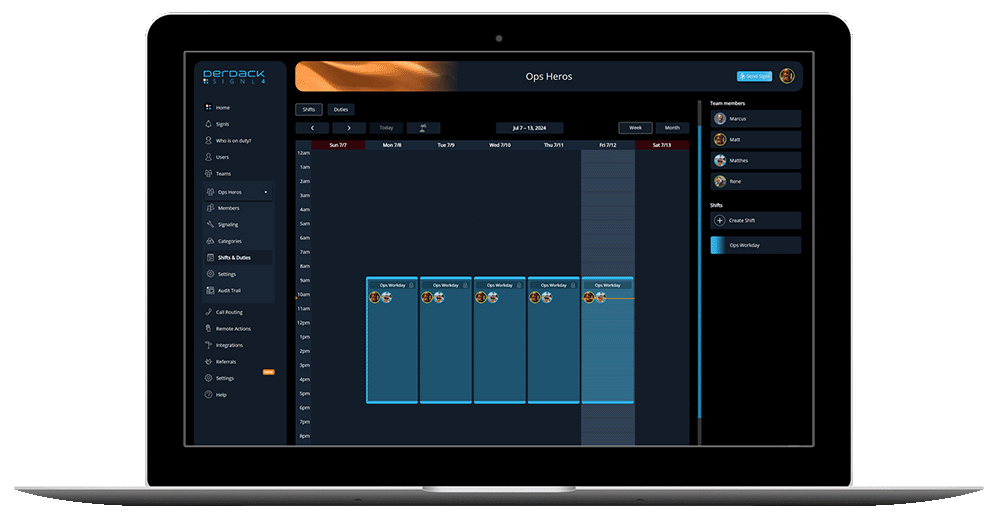Alert notification software is an essential tool for IT operations. It enables teams to quickly respond to critical issues and ensure the smooth running of systems and services. With the increasing complexity of IT environments, it is more important than ever to have a robust alerting system in place. General robustness is essential as such alert notification system will quickly become an essential part of your operation stack. Many of our customers have even included our products into their 24/7 core IT, meaning it is part of their IT backbone system. In this blog post, we’ll discuss six of the most important features of an alert notification software that you need to look for. Let’s go:
1. Customizable Alerts
The first and most important feature of an alerting software is the ability to customize alerts. IT teams need the ability to set up alerts for specific events and conditions, such as a sudden spike in traffic, a drop in system performance, or a failed service. Customizable alerts allow teams to be alerted to potential issues before they become critical, enabling them to quickly respond and prevent downtime. Customizable alerts can be set up based on specific parameters, such as system performance thresholds, log messages, or specific applications or services.
2. Multiple Notification Channels
The second key aspect of an alert notification software is the ability to use multiple notification channels. IT teams need to be notified of issues in real-time, regardless of where they are. This is why it’s important to have the ability to receive notifications through multiple channels, such as mobile push, SMS text, voice calls or even messaging via Slack or Microsoft Teams. This ensures that team members are always reachable, even if they are not at their desk.
3. Escalation and Routing
The third vital factor of an alerting software is escalation and routing. Escalation and routing ensure that critical issues are quickly and efficiently addressed by the right person. For example, if a system administrator is unavailable, the alert can be automatically escalated to a higher-level administrator. This helps to reduce downtime and ensures that issues are resolved as quickly as possible. Routing also ensures that alerts are sent to the right person based on their expertise and availability.
4. Integration with IT Management Tools
The fourth essential trait of an alert notification software is integration with IT management tools. IT teams need to have a complete view of their environment, including systems, applications, and services. Alert notification software should integrate with other IT management tools, such as monitoring and management software, service management tools, and logging systems, to provide a comprehensive view of the IT environment. This helps teams to quickly identify the root cause of issues and resolve them in a timely manner. Integration with multiple IT tools, helps to position the alert notification software as a single point of management for the entire operational org, saving time and avoiding a ‘notification zoo’.
5. On-Call Scheduling
The fifth fundamental characteristic of an alerting software is on-call scheduling. IT operations teams often work 24/7 to ensure that systems and services are running smoothly. On-call scheduling helps to manage the workload of IT teams by assigning specific individuals to be on-call for specific periods of time. This ensures that team members are not overburdened and that critical issues are addressed in a timely manner. Duty scheduling can be customized based on the availability and expertise of team members, and can be automatically updated to reflect changes in staffing or schedules. On-call scheduling and management is also important for ensuring that alerts are being addressed by the right person. For example, if a specific service is managed by a particular team member, that person can be assigned to be on duty for that service, ensuring that alerts for that service are quickly addressed by someone with the necessary expertise. On-call scheduling helps to reduce response times, minimize downtime, and ensure that critical issues are addressed quickly and efficiently.

6. Historical Reporting and Analytics
The sixth and final crucial attribute of an alert notification software is historical reporting and analytics. IT teams need to have access to historical data and analytics to better understand system performance and usage patterns. Historical reporting and analytics help teams to identify trends and patterns, identify potential issues, and make informed decisions about the future of their IT environment. This information is also valuable for reporting and auditing purposes, as it provides a comprehensive view of system performance and usage over time.
Conclusion for picking the right alert notification software
Alert notification software is a critical tool for IT operations, and these six features are essential for ensuring that IT teams are able to respond quickly and efficiently to critical issues. Customizable alerts, multiple notification channels, escalation and routing, integration with IT management tools, and historical reporting and analytics, all help to ensure the smooth running of IT systems and services and minimize downtime. An effective alerting software is a key component of a well-designed IT operations strategy, and is indispensable for ensuring the success of any IT organization.
How SIGNL4 addresses this
SIGNL4 is a highly advanced alerting software that excels in all of the six key features discussed in this blog post. Here’s why:
- Customizable Alerts: SIGNL4 allows IT teams to set up custom alerts based on specific event parameters, such as system performance thresholds, log messages, or specific applications or services. Alert notifications can also be customized based on severity, time of the day or weekday. This helps teams to be alerted to potential issues before they become critical, enabling them to quickly respond and prevent downtime.
- Multiple Notification Channels: SIGNL4 supports multiple notification channels, including mobile push, SMS text and voice calls. SIGNL4 also integrates with Microsoft Teams and Slack for instant messaging. This ensures that team members are always reachable, even if they are not at their desk.
- Escalation and Routing: SIGNL4’s escalation and routing features ensure that critical issues are quickly and efficiently addressed by the right person. The system automatically escalates alerts to higher-level administrators or managers on duty if the primary person is unavailable, helping to reduce downtime and ensure that issues are resolved as quickly as possible.
- Integration with IT Management Tools: SIGNL4 integrates with 165+ IT tools, such as monitoring and IT management software, service management tools, and logging systems, to provide a comprehensive view of the IT environment. This helps teams to quickly identify the root cause of issues and resolve them in a timely manner. Integration is often 2-way, meaning responses from team members through the SIGNL4 mobile app, can be fed back into the originating IT system, supporting a “single pane of glass” and consolidated alert status view.
- On-Call Scheduling: SIGNL4’s convenient on-call scheduling feature helps IT teams manage their workload and ensure that critical issues are addressed in a timely manner. On-call schedules can be customized based on the availability and expertise of team members, and can be automatically updated to reflect changes in staffing or schedules. SIGNL4 uses on-call schedules to route alert notifications to the right people at the right time, avoiding cumbersome handover routines for ‘duty phones’ or weekly reconfiguration of call systems.
- Historical Reporting and Analytics: SIGNL4 provides historical reporting and analytics, allowing IT teams to access historical data and analyze system performance and usage patterns. This information is valuable for reporting and auditing purposes, as it provides a comprehensive view of system performance and usage over time. This feature includes a searchable alert log as well as downloadable CSV reports and logs.

In summary, SIGNL4 is an advanced alert notification software that provides IT teams with the tools they need to respond quickly and efficiently to critical issues. It addresses the ‘must-have features’ described in this blog but goes even beyond it. You can read more here.
Try SIGNL4 30 days for free or download it for Android or iOS.


